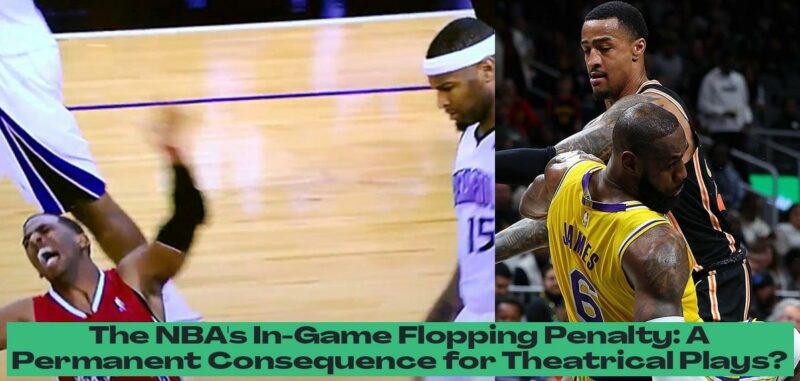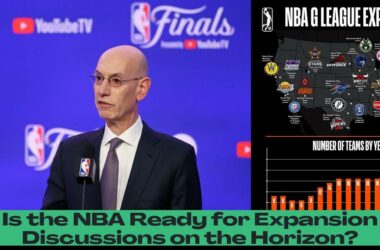The NBA’s Flopping Crackdown: A Permanent Penalty for Theatrics
The NBA’s Board of Governors made a significant decision on Tuesday, July 17th, permanently embedding a penalty for flopping into the league’s playing rules. This move marks a decisive step towards addressing a long-standing issue that has plagued the game for years. So, what exactly is flopping, and why has the NBA taken such a firm stance against it?
Flopping, in essence, is a deceptive tactic employed by players to influence referees’ decisions. It involves exaggerating or feigning the impact of contact from an opponent, often leading to unwarranted foul calls. This act, sometimes referred to as “acting” or “embellishment,” has long been a source of frustration for players, coaches, and fans alike. It undermines the integrity of the game, distorting the true nature of physical contact and creating an unfair advantage for the flopping player.
The NBA’s decision to permanently implement the flopping penalty signifies a commitment to upholding the game’s integrity and promoting fair play. The league has recognized the detrimental impact of flopping on the game, and its permanent rule change reflects a determination to eradicate this deceptive practice. This move is not just about penalizing players; it’s about preserving the beauty and authenticity of the game.
- The NBA has permanently embedded a penalty for flopping into the league’s playing rules.
- Flopping is a deceptive tactic where players exaggerate or feign contact to influence referees’ decisions.
- The league’s decision aims to uphold the game’s integrity and promote fair play by eradicating this unsportsmanlike practice.
- The NBA introduced a more stringent in-game flopping penalty during the 2022-2023 season, now permanently implemented.
- Previously, the league had tried a “flop rule” in 2012 with warnings and technical fouls, but it was not as effective in curbing flopping behavior.
- The permanent flopping penalty signifies a commitment to preserving the authenticity of the game and eliminating unfair advantages gained through deceptive practices.
The Origins of the Flopping Penalty and its Evolution
The NBA’s crackdown on flopping isn’t a new phenomenon. The league has been grappling with this issue for years, implementing various strategies to curb this unsavory practice. In 2012, the league introduced a “flop rule” as part of a one-year trial, aiming to deter players from exaggerating contact. This initial attempt involved issuing a warning to players for their first offense, followed by a technical foul for subsequent offenses. However, this rule proved to be somewhat ineffective, as players continued to engage in flopping with relative impunity.
The NBA, determined to address this persistent issue, introduced a more stringent in-game flopping penalty during the 2022-2023 season. This new penalty, tested on a trial basis last season, has now been permanently implemented. The rule states that any player caught flopping will be charged with a non-unsportsmanlike technical foul. This means that not only will the player be penalized with a foul, but their team will also face a free throw opportunity for the opposing team.
This latest iteration of the flopping penalty is designed to be more effective in deterring players from engaging in this deceptive practice. The increased severity of the penalty, which includes a technical foul and a free throw for the opposing team, creates a significant deterrent for players who might otherwise consider flopping.
The “S.T.E.M.” Rule: Identifying Flops and Enforcing Penalties
The NBA’s commitment to ending flopping goes beyond simply implementing a rule; it also involves creating a clear framework for identifying and penalizing flopping. This is where the “S.T.E.M.” rule comes into play. The acronym “S.T.E.M.” stands for “Secondary, Theatrical, Exaggerated Movements.” This rule provides referees with a tangible and specific guideline for identifying flops.
According to the NBA, reactions to contact that are “secondary,” “theatrical,” or “exaggerated” are considered flops. This means that if a player, after minimal or no contact, reacts with a dramatic fall or exaggerated movement, they are likely to be flagged for flopping. The “S.T.E.M.” rule provides a concrete framework for referees to make informed decisions regarding flopping, ensuring consistency and clarity in their application of the penalty.
Furthermore, the NBA has also emphasized the importance of training referees to identify flopping. The league has dedicated significant resources to educating referees on how to recognize and penalize flopping effectively. This training, coupled with the “S.T.E.M.” rule, aims to ensure that referees have the necessary skills and tools to accurately identify and penalize flopping on the court.
The Impact of the Permanent Flopping Penalty: A New Era for NBA Fairness?
The NBA’s decision to permanently implement the flopping penalty is a significant step towards creating a more equitable and authentic game. By eliminating the deceptive practice of flopping, the league is ensuring that games are decided based on skill, athleticism, and true competition, rather than on players’ ability to deceive referees.
The new rule is expected to have a positive impact on the game in several ways. First, it will deter players from engaging in flopping, leading to a more honest and genuine style of play. Second, it will reduce the number of unwarranted foul calls, resulting in a more balanced and fair game for all teams. Third, it will improve the overall quality of the game, as players focus on playing within the rules and displaying their true skills. Finally, it will enhance the enjoyment of the game for fans, who will be able to witness a more authentic and exciting brand of basketball.
The decision to permanently implement the flopping penalty is a testament to the NBA’s commitment to fostering a culture of fair play and integrity. It’s a clear signal that the league is serious about addressing this issue and creating a more enjoyable and engaging experience for players, coaches, and fans alike. As the new rule takes effect, it will be interesting to see how players adapt to this permanent change and how it ultimately shapes the future of the game.
Beyond Flopping: Other Penalties in the NBA
While flopping is a significant issue, it’s important to acknowledge that the NBA has a comprehensive system of rules and penalties designed to maintain order and fairness on the court. Here are some other common penalties that players and coaches might face:
-
Technical Fouls: These are penalties given for unsportsmanlike conduct, such as arguing with officials, taunting opponents, or delaying the game.
-
Personal Fouls: These are penalties given for illegal contact with an opponent, such as hitting, tripping, or holding.
-
Flagrant Fouls: These are serious fouls that involve excessive force or unnecessary physical contact. Flagrant fouls can result in free throws for the opposing team and even ejection from the game.
-
Unsportsmanlike Fouls: These are fouls that involve an act of unsportsmanlike conduct, such as arguing with officials, taunting opponents, or delaying the game.
-
Double Fouls: These are fouls called on both players involved in a play, often when both players commit a foul simultaneously.
-
Ejections: Players can be ejected from the game for serious violations, such as fighting, excessive foul accumulation, or unsportsmanlike conduct.
-
Suspensions: Players can be suspended for games or even longer periods for serious violations, such as fighting, excessive foul accumulation, or engaging in unsportsmanlike conduct.
-
Fines: The NBA can also levy fines on players and coaches for various violations, such as excessive foul accumulation, unsportsmanlike conduct, or making public statements that are detrimental to the league.
These penalties are designed to ensure that the game is played fairly and that players and coaches are held accountable for their actions. By having a comprehensive system of rules and penalties, the NBA aims to maintain order on the court and create a level playing field for all teams.
The Future of the NBA: A Game of Skill and Integrity
The NBA’s commitment to eradicating flopping is a positive step towards ensuring that the game is decided based on skill, athleticism, and true competition. The league’s decision to permanently implement the flopping penalty is a statement of intent, demonstrating its commitment to upholding the integrity of the game.
As the new rule takes effect, it will be interesting to see how players adapt to this permanent change. Will players fully embrace the rule and adopt a more genuine style of play, or will there be continued instances of flopping? Will referees be able to consistently identify and penalize flopping effectively? Only time will tell how the new rule will impact the game in the long run.
Ultimately, the NBA’s goal is to create a game that is both exciting and fair. By eliminating the deceptive practice of flopping, the league is taking a significant step towards achieving this goal. As the NBA continues to evolve and adapt, its commitment to upholding the game’s integrity will be critical to its success. This commitment, manifested in its efforts to eliminate flopping and ensure fair play, ensures that the NBA remains a thrilling spectacle, captivating fans worldwide.









